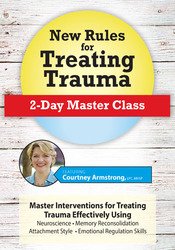

In this breakthrough recording, you'll discover the new rules for treating trauma.
You’ll discover how memory reconsolidation is a recent neuroscience breakthrough that revealed a new way to heal trauma at its roots by process of recalling and updating a memory.
During this workshop, I’ll provide you with step-by-step instructions and techniques you can master in each phase of trauma treatment. This is the trauma training that specifically gives you skills in the phenomena of memory reconsolidation. Let me show you why memory reconsolidation is necessary for transforming your trauma work with clients. I will give you a simple protocol to use to reconsolidate a traumatic memory in as little as one session!
Full of thought provoking lecture, engaging case studies and guided instruction, you will learn the essential skills that your clinical practice is missing to help your clients move forward in living a meaningful life. Leave this master class armed with tools you can use in your very next session.
This online program is worth 12.5 hours CPD.
| File type | File name | Number of pages | |
|---|---|---|---|
| Manual - New Rules for Treating Trauma (3.32 MB) | 44 Pages | Available after Purchase |

Courtney Armstrong, LPC-MHSP, is a licensed professional counselor who specializes in grief and trauma recovery with over 25 years’ experience. Certified as an approved consultant by the American Society of Clinical Hypnosis (ASCH), she is the founder of the Institute for Trauma Informed Hypnotherapy and has developed clinical hypnosis training programs for the Veterans Administration, serves on the ASCH Education and Training committee, and has trained thousands of clinicians worldwide.
Courtney is also bestselling author of the books, Rethinking Trauma Treatment: Attachment, Memory Reconsolidation, and Resilience, The Therapeutic “Aha”, and Transforming Traumatic Grief. She has been featured as a trauma and grief expert on national television and radio programs and contributes to publications such as Psychotherapy Networker, Counseling Today, and The Science of Psychotherapy.
Speaker Disclosures:
Financial: Courtney Armstrong is the founder and president of Courtney Armstrong Consulting and Training Services and the Institute for Trauma Informed Hypnotherapy. She receives a speaking honorarium and recording royalties from PESI, Inc. She has no relevant financial relationships with ineligible organizations.
Non-financial: Courtney Armstrong serves on the Clinical Hypnosis Education and Training Committee of the American Society for Clinical Hypnosis. She is a member of the American Mental Health Counselor's Association, the Tennessee Licensed Professional Counselors Association, and the Chattanooga Area Psychotherapy Association.
New Rules for Treating Trauma
Rule #1
Understand how Trauma Impacts the Brain
Rule #2
Consider Your Client’s Attachment Style
Rule #3
Attune, Lift, and Lead
Rule #4
Teach Emotional Regulation Skills
Rule #5
Part 1 - Reconsolidating Traumatic Memories
Rule #6
Part 2 - Reconsolidate Traumatic Memories
Rule #7
Facilitate Post-Traumatic Growth
Applications for Special Populations
Limitations of the Research & Potential Risks Memory Reconsolidation
| 5 |
|
| 4 |
|
| 3 |
|
| 2 |
|
| 1 |
|
Satisfaction Guarantee
Your satisfaction is our goal and our guarantee. Concerns should be addressed to info@pesi.co.uk or call 01235847393.
Please wait ...